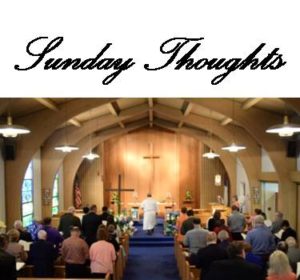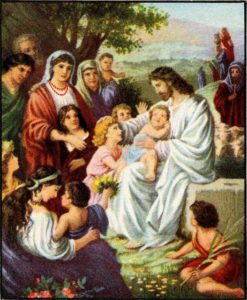 The Lord be with you
The Lord be with you
This coming Sunday (Pentecost 20; October 7) we will be switching to setting four of the Divine Service (page 302). This service is designed as a Communion service and so fits our schedule perfectly. The parts that are sung are like hymns.
Our appointed lessons are Genesis 2:18–25, Hebrews 2:1–18, and Mark 10:2–16. With our Three Year lectionary we follow a semi-continuous reading in our epistle lessons. Last Sunday we finished James and this coming Sunday we will begin Hebrews. As you can see, we are beginning with chapter two so we don’t actually read the entire book. We will continue with Hebrews through November 18 except for the special readings we will use on Reformation Sunday (October 28)
We will continue featuring readings from Mark for our Gospel lessons. The Old Testament lessons are selected to reflect the Gospel lesson. So Jesus, in answering a question about divorce and marriage, refers to the first marriage of Adam and Eve in the Garden of Eden. The Old Testament lesson is the actual passage Jesus is referring to.
The Old Testament and Gospel lessons make for an obvious sermon on the topic of marriage and family.
The hymns for Sunday will be:
Opening Hymn: Christ Be My Leader (LSB 861)
Sermon Hymn: Our Father, by Whose Name (LSB 863)
Distribution Hymns:
Oh, Blest the House (LSB 862)
What Is This Bread (LSB 629)
Gracious Savior, Grant Your Blessing (LSB 860)
Closing Hymn: The Day of Resurrection (LSB 478)
Below are the lessons for Sunday with a few thoughts.
Genesis 2:18–25
18 Then the LORD God said, “It is not good that the man should be alone; I will make him a helper fit for him.” 19Now out of the ground the LORD God had formed every beast of the field and every bird of the heavens and brought them to the man to see what he would call them. And whatever the man called every living creature, that was its name. 20The man gave names to all livestock and to the birds of the heavens and to every beast of the field. But for Adam there was not found a helper fit for him. 21So the LORD God caused a deep sleep to fall upon the man, and while he slept took one of his ribs and closed up its place with flesh. 22And the rib that the LORD God had taken from the man he made into a woman and brought her to the man. 23Then the man said,
“This at last is bone of my bones
and flesh of my flesh;
she shall be called Woman,
because she was taken out of Man.”
24 Therefore a man shall leave his father and his mother and hold fast to his wife, and they shall become one flesh. 25And the man and his wife were both naked and were not ashamed.
My initial thoughts: One thing that always strikes me when I read the first chapters of Genesis is how off-topic much of the discussion today is. To some extent this cannot be avoided because the discussion is driven by the critics of the Bible who claim the accounts in the first eleven chapters are fictional. However important it is to defend the historical value of these chapters, that is not why the Holy Spirit had Moses record them. So, if our discussion concerning these eleven chapters stops after defending their historical reliability, we have missed the forest for the tree. In our reading we are seeing the foundation of marriage. Notice that marriage begins before the fall into sin. Notice that the first things God said is “not good” is that Adam was alone. Notice also that Man and Woman are of the same flesh. Jesus will zoom in on the marriage idea in this reading, and we will do the same in Sunday’s sermon.
Hebrews 2:1–18
1 Therefore we must pay much closer attention to what we have heard, lest we drift away from it. 2For since the message declared by angels proved to be reliable, and every transgression or disobedience received a just retribution, 3how shall we escape if we neglect such a great salvation? It was declared at first by the Lord, and it was attested to us by those who heard, 4while God also bore witness by signs and wonders and various miracles and by gifts of the Holy Spirit distributed according to his will.
5 For it was not to angels that God subjected the world to come, of which we are speaking. 6It has been testified somewhere,
“What is man, that you are mindful of him,
or the son of man, that you care for him?
7 You made him for a little while lower than the angels;
you have crowned him with glory and honor,
8 putting everything in subjection under his feet.”
Now in putting everything in subjection to him, he left nothing outside his control. At present, we do not yet see everything in subjection to him. 9But we see him who for a little while was made lower than the angels, namely Jesus, crowned with glory and honor because of the suffering of death, so that by the grace of God he might taste death for everyone.
10 For it was fitting that he, for whom and by whom all things exist, in bringing many sons to glory, should make the founder of their salvation perfect through suffering. 11For he who sanctifies and those who are sanctified all have one source. That is why he is not ashamed to call them brothers, 12saying,
“I will tell of your name to my brothers;
in the midst of the congregation I will sing your praise.”
13And again,
“I will put my trust in him.”
And again,
“Behold, I and the children God has given me.”
14 Since therefore the children share in flesh and blood, he himself likewise partook of the same things, that through death he might destroy the one who has the power of death, that is, the devil, 15and deliver all those who through fear of death were subject to lifelong slavery. 16For surely it is not angels that he helps, but he helps the offspring of Abraham. 17Therefore he had to be made like his brothers in every respect, so that he might become a merciful and faithful high priest in the service of God, to make propitiation for the sins of the people. 18For because he himself has suffered when tempted, he is able to help those who are being tempted.
My initial thoughts: The writer of Hebrews does not tell us who he is so most everyone has been championed as its writer. Because the book does such a wonderful job of interpreting the Old Testament in light of Jesus, I feel one of the Emmaus Road Disciples, who participated in one of the best Bible studies of all time, are good candidates (Luke 24:13-34). In chapter 1, the writer establishes that Jesus is the Son of the Father. So when chapter 2 begins with “therefore,” he means “because Jesus is the incarnate Son of God” we need to pay closer attention to the subject at hand. The danger is that we might drift away. This is the consistent pattern in the Bible. If we don’t “keep our eyes fixed on Jesus” (Hebrews 12:2) we drift away and the way we keep our eyes fixed on Jesus is by attending to the Word. The main point of this chapter is the superior/central/critical/etc. position our incarnate God has. As he does throughout the book, the writer establishes his point by using the Old Testament. I might also add that most feel the book was written as persecution of Christianity was on the rise and Jewish believers were tempted to return to the temple religion, which was protected in Roman Law. The writer was telling these tempted Jews that Jesus is superior to Moses and the faith of the chief priests.
Mark 10:2–16
2 And Pharisees came up and in order to test [Jesus] asked, “Is it lawful for a man to divorce his wife?” 3He answered them, “What did Moses command you?” 4They said, “Moses allowed a man to write a certificate of divorce and to send her away.” 5And Jesus said to them, “Because of your hardness of heart he wrote you this commandment. 6But from the beginning of creation, ‘God made them male and female.’ 7‘Therefore a man shall leave his father and mother and hold fast to his wife, 8and the two shall become one flesh.’ So they are no longer two but one flesh. 9What therefore God has joined together, let not man separate.”
10 And in the house the disciples asked him again about this matter. 11And he said to them, “Whoever divorces his wife and marries another commits adultery against her, 12and if she divorces her husband and marries another, she commits adultery.”
13 And they were bringing children to him that he might touch them, and the disciples rebuked them. 14But when Jesus saw it, he was indignant and said to them, “Let the children come to me; do not hinder them, for to such belongs the kingdom of God. 15Truly, I say to you, whoever does not receive the kingdom of God like a child shall not enter it.” 16And he took them in his arms and blessed them, laying his hands on them.
 My initial thoughts: In this lesson the Pharisees sought to test Jesus by posing a question about divorce. Moses had permitted it. Jesus points to our reading from Genesis to establish the original life-long purpose of marriage. Moses’ example of permitting divorce is labeled as an accommodation due to sin. Sin does happen and it can destroy marriage, but that is not God’s desire. The lesson moves on to one of those times people were bringing children to Jesus. The disciples seek to prevent this from happening. As Jesus so often does, he uses the faith of the children as a point of instruction. Among other things, this passage clearly teaches that small children can indeed have saving faith. If we bring in Luke 18:15, we note that “small children” includes infants. Mark’s coupling of the discussion on marriage with a story about children makes family a natural topic for a sermon.
My initial thoughts: In this lesson the Pharisees sought to test Jesus by posing a question about divorce. Moses had permitted it. Jesus points to our reading from Genesis to establish the original life-long purpose of marriage. Moses’ example of permitting divorce is labeled as an accommodation due to sin. Sin does happen and it can destroy marriage, but that is not God’s desire. The lesson moves on to one of those times people were bringing children to Jesus. The disciples seek to prevent this from happening. As Jesus so often does, he uses the faith of the children as a point of instruction. Among other things, this passage clearly teaches that small children can indeed have saving faith. If we bring in Luke 18:15, we note that “small children” includes infants. Mark’s coupling of the discussion on marriage with a story about children makes family a natural topic for a sermon.
It is my hope that this look ahead can help in preparing for our Sunday worship.
Blessings in Christ,
Pastor
